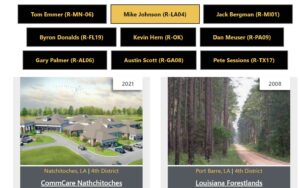FOR IMMEDIATE RELEASE
March 4, 2015 – Contact Bob Rapoza, (202) 393-5225
Bipartisan Legislation Introduced to Leverage Private Investment in Economically Distressed Communities, Expand Businesses and Create Jobs
Washington, D.C. – Senators Roy Blunt (R-MO) and Chuck Schumer (D-NY) circulated a Dear Colleague today, asking their colleagues to cosponsor new legislation they are leading in the Senate that would make the New Markets Tax Credit (NMTC) permanent. New Markets Tax Credit Extension Act of 2015 (S. 591) would ensure that economically distressed rural and urban communities have access to financing to grow their economies and create jobs. This bill follows the introduction of companion legislation in the House (H.R. 855) and a call for permanency in the 2016 President’s Budget.
“The broad level of bipartisan support for the New Markets Tax Credit is a direct result of the effectiveness of the Credit in addressing the needs of small town, farming communities and urban neighborhoods left outside the economic mainstream,” said Bob Rapoza, spokesperson for the NMTC Coalition. “The fact is that the NMTC fosters public-private partnerships, grows local economies, resulting in nearly 750,000 jobs in communities that need it the most.”
The NMTC began as bipartisan collaboration between Democratic President Bill Clinton and Republican Speaker of the House Dennis Hastert to attract private capital investment in low income communities and continues to garner support from lawmakers on both sides of the aisle. Since it was implemented, the NMTC has secured $31 billion in direct NMTC investments to businesses in low-income areas and leveraged a total of $63 billion.
The results:
- NMTC investments have generated over 744,000 jobs, at a cost of less than $20,000 per job.
- Between 2003 and 2012, more than 1,200 NMTC projects involved community amenities like healthcare facilities, schools, nonprofit service providers, and daycare centers.
- More than 72 percent of all NMTC investments have been in communities exhibiting severe economic distress, including unemployment rates at least 1.5 times the national average, a poverty rate of 30 percent or more, or a median income at or below 60 percent of the area median.
- The NMTC pays for itself. For example, in 2012, the NMTC produced $15.2 billion in economic activity, and this activity generated $984 million in federal tax revenue, more than enough cover the $800 million annual cost of the program in 2012.
“The NMTC is one of several dozen tax credits that have an unknown fate, after Congress only passed a one-year, retroactive extension in the last weeks of the 113th Congress, leaving the credit expired just a few weeks later on December 31, 2014,” said José Villalobos, President of the NMTC Coalition and Senior Vice President of TELACU. “The introduction adds to a growing demand for a more definite answer on tax reform and provides hope that lawmakers can find common ground that benefits the communities and people they represent.”
Senators Steve Daines (R-MT) and Ben Cardin (D-MD) joined as original cosponsors of the Senate NMTC bill. For examples of how the NMTC is making an impact your state, see the NMTC Coalition’s Project Profile Map.





